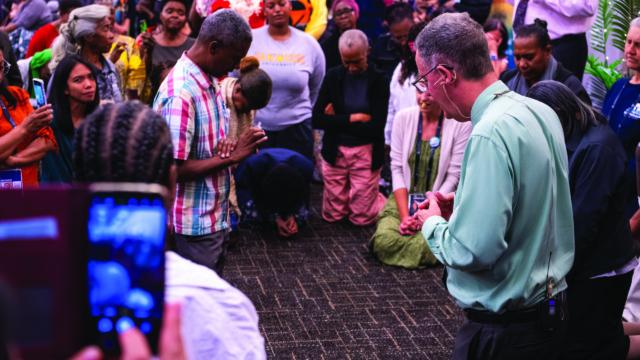By Douglas Inglish
When you look at the title line, there are several possibilities your mind could fill in where the blank space is. Many words in that blank would be true and have implications worth pondering.
Some would put it in the present tense and say Jesus lives for me. Other present tense forms that would also work, but might not be your first thought, would be intercedes, or cares. You could probably think of a few others.
The most common response is likely one that forms the sentence in the past tense: Jesus died for me. We hear the phrase often enough. It’s repeated in sermon and song, printed in books and articles, shared in Sabbath School classes. It is a thought that elicits many emotional responses from us such as gratitude, unworthiness, determination, rejoicing, and wonder, among others. It is commonly thought of as the foundational event of Christianity.
But is it? Is His death on the cross, clearly done on behalf of me, you, and everyone else, really the foundational event of Christianity?
I say no. For that, I fill in the blank another way. Jesus rose for me.
If Jesus had lived a life worthy of my imitation, left behind a treasure of teachings that enrich my life, and carried out the principles of His life to the point that He willingly died as an example of how much He loves me and how far He would go to teach me how to live a better life, and that’s all there is to the story, then Christianity would be nothing but a manner of living. If it survived into this century, it would only be found in a few volumes in the self-help section of your local bookstore.
The church was founded on the truth that Jesus rose for me, because it is the resurrection that gives meaning to the crucifixion. It would not matter so much if He had died unless “Christ has indeed been raised from the dead, the firstfruits of those who have fallen asleep” (I Corinthians 15:20, NIV).
None of this is to say that His substitutionary death is anything less than all that Scripture says it is. It is my pardon, my salvation, and my debt paid. But it is not my hope. Go back and read the verses preceding the text above and see Paul’s argument that our hope of living eternally is entirely based on Jesus having risen after His death.
This is Passover weekend in the Jewish calendar and is observed by many Christians as Easter. The symbolism of Jesus being sacrificed that weekend so that death might pass over us is significant. But unlike the lambs that were a type of what was to come, Christ the Antitype conquered death. That is our hope, that is our future, and that is the foundation of all Christianity.
Yes, Jesus died for me, and yes, He lives for me. But in between those realities lies the event that gives meaning to both. Jesus rose for me.
—Douglas Inglish is RMC vice president for administration. Photo from Rajmund Dabrowski.




